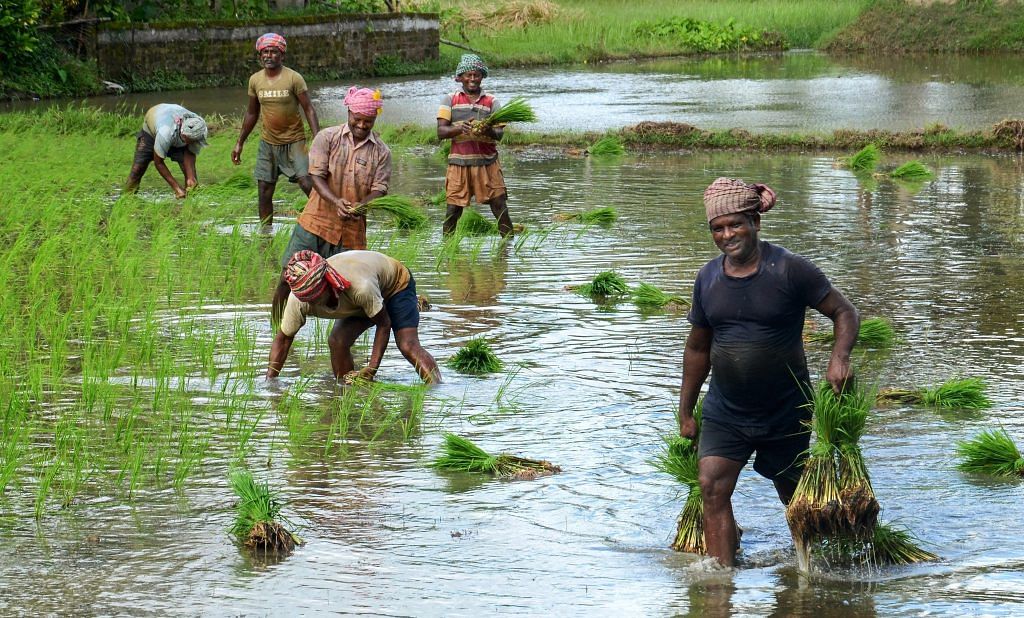New Delhi: Amid a huge trail of devastation, Cyclone Amphan has also severely damaged the rabi crop paddy in West Bengal and betel crop in Odisha, apart from hitting sesame, vegetables and mango farmers.
West Bengal is a major cultivator of the rabi crop.
“The state agriculture department of West Bengal is doing a damage assessment of the crop (paddy) in the state caused by Cyclone Amphan. There are damages across 14 out of the 23 districts in West Bengal and at least six districts in Odisha,” a Union Agriculture Ministry official told ThePrint.
“The preliminary damage count coming from the state agriculture department in West Bengal is around Rs 370 crore, while in Odisha crops under acreage of over 1,20,000 hectare have been affected. Apart from rabi paddy crop, other horticulture and sesame produce has also been affected,” said the official who didn’t wish to be named.
Also read: Now there’s another virus in Maharashtra, and it’s destroying the tomato crop
Cyclone adds to lockdown woes
For most of the farmers in West Bengal and Odisha, Cyclone Amphan has aggravated the distress caused by the nationwide lockdown that was enforced on 25 March.
Prior to the cyclone making landfall on 20 May, most of the farmers in these states were facing a shortage of labour, transportation, packing material and market-demand accessibility. With major relaxations in the recent easing of the lockdown, the farmers hoped to see a rise in demand again, leading to better prices. But the devastation from the cyclone has shattered those hopes.
Pratap Chandra Behera, a progressive farmer in Hooghly, West Bengal said, “The cyclone led to water logging in the farm with ripened paddy and as the crop was harvest-ready, it has been completely destroyed. As the lockdown was relaxed, I had started cutting my crop but could only manage to harvest 5 acres out of 47 acres of the crop when the cyclone destroyed everything.”
Behera said he could not harvest the crop earlier as most machines and labour were not available due to the lockdown. “Also, there was no demand in the market or mandis so I thought it’s better to harvest the crop with a bit of delay as my 13 acre of brinjal produce was already sold at (a low price of) Rs 5/kg in lockdown,” he said.
Speaking about crop damage across West Bengal, Jagannath Chatterjee, deputy director, Agriculture for Burdwan (East), said, “It’s not just the paddy crop, which is a major rabi crop, that has been completely destroyed by the cyclone, but mango orchard owners in Murshidabad and flower growers in Hooghly have their crops completely wiped out too.”
He added, “In Burdwan alone, paddy crop on around 50,000 hectares was left to be harvested, out of which almost 35,000 hectares has been destroyed. Similarly, sesame crop on 12,000 hectares and vegetables across 8,000 hectares has been completely wiped out.”
He said the damage count will increase as reports of crop damage are yet to arrive from remote areas such as South-24 Parganas due to network issues.
Also read: Flowers ending up as ‘cheap cattle feed’ — floriculturists turn to fruits as trade wilts
Odisha farmers’ betel loss
Just a year after being ravaged by Cyclone Fani, Odisha farmers have now been struck with Cyclone Amphan.
Thousands of betel farmers across Odisha in districts like Balasore, Bhadrak, Kendrapara and Jagatsinghpur have been left completely devastated as strong winds and intense rain caused by Cyclone Amphan wiped out the sensitive betel leaf crop entirely.
Mukesh Swain, a betel farmer in Pattamundai of Kendrapara in Odisha, said, “Betel leaf farming requires optimum care while cultivating as the leaf is very sensitive to temperature, wind and rain. I spent around Rs 4 lakh to cultivate paan over two-acre land but the cyclone has completely flattened all of my betel leaves.”
He added that due to the lockdown restrictions, they were unable to sell their produce since paan shops were closed. “We couldn’t until a few days ago, when the government finally allowed them to open. The cyclone destroyed everything as soon as we started harvesting, but we have to pay back the loans to the bank and local lender anyhow,” Swain said.
Also read: Delhi to Chennai, wholesale vegetable mandis are turning into festering Covid hotspots
